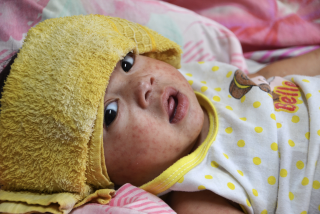Officials Fear a Renewal of Measles Epidemic : Health: Some say the resurgence of the disease signals a breakdown in the vaccination delivery system. Poor children face the greatest risk.
- Share via
NEW YORK — Four-year-old Rhenita Brade doesn’t know what an epidemic is, but she’s seen measles firsthand.
“My friend Samantha, she got those little measles on her face. And then it started itching,” she said, rubbing the spot on her arm where she had just been immunized. “I don’t want to get no measles.”
She probably won’t, but thousands of other children already have become ill in what federal epidemiologists say is the worst outbreak in nearly two decades.
Since 1989, the measles epidemic has claimed more than 130 lives around the country--more than in the previous 15 years combined.
Although the current outbreak seems to be on the wane, officials warn that it could rebound unless the vaccination delivery system is improved, especially in poor areas where basic health care is hard to come by.
“If we don’t make an effort to try to reach those kids who are now being born, they will turn into the measles cases of 1993, 1994 or 1995,” said William Atkinson, an epidemiologist at the federal Centers for Disease Control in Atlanta.
President Bush has announced plans to send a team of experts this month to six cities “to learn why kids aren’t getting immunized.”
Health officials have several answers, including lack of access to health care, a shortage of vaccine and parental ignorance.
Most school systems require proof of vaccination before a child is admitted. But Atkinson said the current epidemic is unique in that it hit preschoolers the hardest.
Measles cases averaged about 3,100 a year in the 1980s. But in 1989, the CDC recorded 18,193 cases, then 27,785 in 1990. Last year, 89 of those victims died--the most since 1971.
This year, the CDC has recorded 8,036 cases as of Aug. 24. Almost half of the 1991 cases so far have been in New York City, including 15 confirmed deaths.
Doctors usually recommend children get two measles shots: at 12 months and before starting school. But many local health officials now recommend that children in hard-hit neighborhoods get their first shot as early as 6 months. And they’re going all out to spread the word.
Stars like Bill Cosby are taping commercials for National Immunization Week, Sept. 21-29. Former First Lady Rosalynn Carter, who worked on a national immunization campaign in the 1970s, announced another effort aimed at children in the poverty-stricken Mississippi Delta.
In New York City, where an estimated 75,000 preschoolers are either unimmunized or under-immunized, the city and state launched a campaign with a goal of “zero measles cases, period,” said Gov. Mario M. Cuomo.
Because Latino children have been particularly hard hit, health officials have been targeting their parents with ads in Spanish-language media and programs at Latino community events.
“They have language barriers or other priorities in their lives that prevent them from coming to us” for immunizations, said Chuck Alexander, immunization program director for the Los Angeles County Health Department. “Those children remain susceptible, and when measles is introduced in a larger community like L.A., it’s going to run wild.”
Rhenita’s mother, Novella Brade of the Bronx, says she thinks parents are paying less attention to immunizations in the face of modern health problems, such as AIDS.
“They might think that these diseases are ancient, that they don’t affect children these days,” she said. “I think it’s ignorance more than anything else.”
Her daughter was examined at a mobile health unit operated by the Children’s Health Project, which hoped to immunize 4,000 children before school began Sept. 11.
Dr. Irwin Redlener, president of the organization launched in 1987 with money from musician Paul Simon, said he thinks the measles epidemic is a result of society’s failure to get health care to the poor.
“We’re hoping this campaign will result in not only kids getting immunized . . . but also that this whole thing will call attention to children not getting adequate care and not having access to care,” he said.
Others argue that the health care is there, but that struggling parents often cannot take advantage of it.
“Things like getting a job, finding a place to live and putting food on the table often take precedence over getting your child immunized on time,” Alexander said.
Many clinics there and elsewhere have instituted evening and weekend hours to accommodate working parents.
In a recent survey by the Children’s Defense Fund, 71% of the nation’s community health clinics reported they were short of government-supplied vaccines for measles, mumps, rubella, pertussis and a type of influenza.
The vaccines can cost four times as much on the open market--up to $37 a dose for measles vaccine. Only about half the clinics said they were able to buy enough to cover their shortfall. The others were forced to delay immunizations.
Health officials worry about what that means for the future.
Ken Senger, director of South Dakota’s Division of Public Health, said his state had no measles cases for a decade but recorded 23 last year. Rapid City, S.D., is one of the cities the President’s commission plans to visit.
“Measles is kind of a marker,” Senger said. “It’s a highly contagious disease. One has to believe that if we’re seeing a problem with measles right now, it’s very likely that other diseases--diphtheria, polio, rubella, mumps--might resurface.
“The obvious interest of public health officials is to try to get ahead of that and try to improve the system.”






